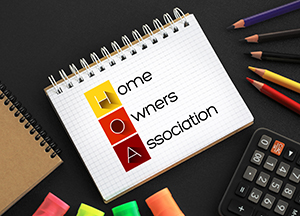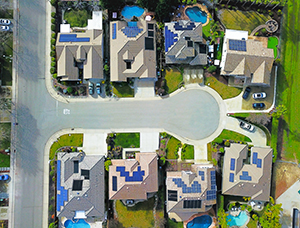What is a homeowners association? This is a common question many people ask during the home selection process. Before buying a home in an HOA, it is important to consider the implications of living in one.
What is a Homeowners Association?
Simply put, a homeowners association is an organization of homeowners that is responsible for managing and maintaining the neighborhood. It is a legal entity similar to a corporation. In fact, in many states, homeowners associations file as nonprofit corporations.
When a person buys a home in a homeowners’ association, they become a member of that association. Membership is typically mandatory and automatic. With membership comes specific responsibilities.
Some associations allow owners to opt in or out of membership. These are called voluntary homeowners associations. If someone chooses not to become a member, they are not required to fulfill the obligations that come with membership. Likewise, they cannot take advantage of the association’s amenities and services.
Members have responsibilities to the association, but the reverse is also true. The association must perform specific functions and duties, including maintaining common areas, enforcing rules, and collecting dues.
What Does HOA Mean?
Buyers might encounter the term “HOA.” What does HOA stand for? What is Han OA in real estate? HOA is simply an abbreviation of homeowners association. In real estate, an HOA is an organization that operates and manages a community of homeowners/members.
HOA vs COA
A COA is a condominium owners’ association, which works similarly to an HOA. Condo associations also have specific roles and responsibilities, and unit owners also have obligations toward the COA.
The main difference between an HOA and a COA is the type of property they manage. In an HOA, the homes are typically single-family detached homes. On the other hand, in a COA, residents live in units with shared elements.
HOA Meaning and Purpose
Every association is governed by a set of directors known as the HOA board. Board members act as stewards of the association, fulfilling their roles and duties.
HOA responsibilities include the following:
- Collect dues and assessments
- Plan and monitor the budget
- Maintain the reserves
- Prepare financial statements
- Make financial decisions
- Maintain common areas
- Hire and manage vendors
- Review and purchase insurance
- Enforce the rules and regulations
- Monitor violations
- Resolve homeowner disputes
- Oversee architectural changes
- Communicate with homeowners
- Review and comply with governing documents
- Pay and file taxes
- Ensure legal compliance
Benefits of Living in an HOA
Although membership comes with responsibilities, many still choose to live in an HOA-managed community. This is because HOA living also offers numerous benefits. Let’s break them down below.
1. Common Area Maintenance
One of the chief responsibilities of an HOA is maintaining common areas. Associations regularly inspect and perform routine maintenance on common areas and facilities. If any of them need repairs, the association also handles it.
Common areas can include amenities, sidewalks, hallways, elevators, lobbies, and landscaping. With an HOA, residents don’t have to worry about keeping these places clean and functional. They pay a fee to the HOA, which it then uses to cover maintenance costs.
2. Access to Amenities
Residents of an HOA enjoy access to a variety of amenities and facilities. These can vary from one association to another. The most common amenities include swimming pools, clubhouses, fitness centers, and playgrounds. Some even have private parks, tennis courts, and lakes.
Members of the association can use these amenities at no cost. They can even bring guests, depending on the association’s guest policy. Furthermore, their association dues cover the cost of cleaning and maintaining these spaces.
3. Safety and Security
In an HOA, residents benefit from increased safety and security. Many neighborhoods have security measures in place, such as security cameras, gates, and access codes. Some even have security guards posted in high-traffic areas.
4. Sense of Community
Associations often organize social events and activities for the community’s residents. These events enable residents to socialize and become acquainted with their neighbors. This leads to a sense of community and camaraderie that’s hard to instill in traditional neighborhoods.
5. Higher Property Values
By maintaining common areas, improving security, and ensuring aesthetic appeal, associations can positively influence property values. As a result, homeowners can preserve their investments and even get a sizable return if they decide to sell.
What is an HOA? Key Considerations Before Buying
Before purchasing a home in an HOA, buyers should understand the responsibilities that come with being a member. These include paying HOA fees, maintaining their properties, adhering to architectural standards, and following the rules and regulations.
Let’s break these down below.
1. HOA Fees
One of the primary obligations of an HOA member is to pay dues and assessments on time. Associations collect regular fees and use them to pay for operating expenses. A portion of these fees also typically goes into a reserve account.
HOA fees can vary depending on the location, size, and needs of the association. The association board determines them through budget and expense planning. When unanticipated costs arise, members may also be required to pay special assessments, which are one-time fees.
2. Maintenance Responsibilities
Homeowners have a responsibility to maintain their properties. This includes keeping the exterior of their homes clean, mowing their lawns, and ensuring their garages are free of any obstructions.
3. Architectural Standards
Homeowners must comply with the association’s architectural standards. These dictate the approved appearance of home exteriors, landscaping, and garages.
If a homeowner wishes to modify or improve the exterior of their home, they must typically go through an approval process. Making unapproved changes can result in penalties. Even something as simple as changing the color of the front door may require permission from the HOA.
4. HOA Rules
Associations have rules and covenants that homeowners are required to follow. Depending on the association, these rules can include pet policies, rental restrictions, parking rules, holiday decoration rules, and more.
If a homeowner violates a rule, they may face several consequences, starting with a written warning. Other possibilities include monetary fines and a temporary suspension of privileges.
What Happens if You Don’t Pay HOA?
When homeowners default on their fees, the association can use certain collection methods. Depending on state laws and the governing documents, these methods include the following:
- Late Fees. An HOA may charge a late fee or interest in addition to the sum due.
- Legal Action. An HOA may file a lawsuit against the owner, and a court may order wage garnishment to recoup the debt.
- Liens. An HOA may place a lien on the home of the delinquent owner. The owner must first satisfy the lien before they can sell their home or refinance their mortgage.
- Foreclosure. In more extreme cases, an HOA may foreclose on the lien and sell the home at an auction to settle the unpaid balance.
State Laws Regulating HOAs
State laws govern homeowners associations. Compliance with these laws is mandatory. In Virginia and Maryland, the following state laws apply:
- District of Columbia Condominium Act
- District of Columbia Cooperative Act
- Maryland Condominium Act
- Maryland Homeowners Association Act
- Virginia Condominium Act
- Virginia Real Estate Cooperative Act
- Virginia Property Owners’ Association Act
What is a Homeowners Association? Answered!
Homeowners associations play an essential role in the preservation of curb appeal and property values. Before purchasing a home in an HOA, buyers should first understand what responsibilities come with membership.
Keymont Community Management provides expert management services to associations in Virginia, Maryland, and the Washington, D.C. area. Call us today at 703.752.8300 or contact us online to get started!
RELATED ARTICLES:
- HOA Board Of Directors: Roles, Duties, And Fiduciary Responsibilities
- POA vs HOA vs COA: What’s The Difference?
- What Are Regular And Special Assessments In An HOA?




